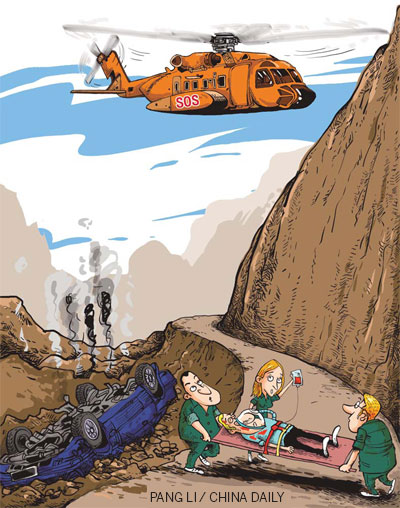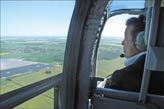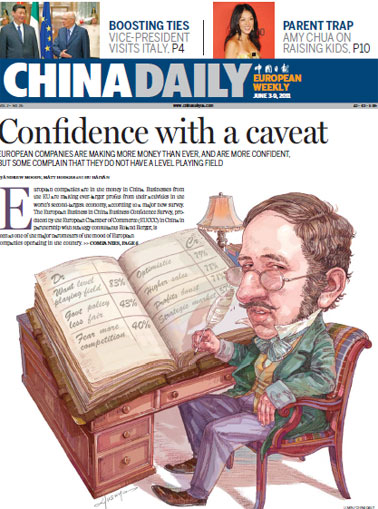Top News
More adventurers hurt, push limits
Updated: 2011-06-05 08:02
By Jiang Xueqing (China Daily)

With an increasing number of people seeking thrills in the great outdoors, injuries and even deaths are climbing. Jiang Xueqing looks at how teams step up to help.
While climbing the Tiger Leaping Gorge in Lijiang, Yunnan province, on Jan 21, a 26-year-old United States man tumbled and broke his neck and skull.
He was rushed to the Lijiang People's Hospital, but it was too small to perform the difficult surgery he needed and his friend called the Beijing alarm center for International SOS for help.
Within 48 hours, the medical assistance provider had arranged an air ambulance and sent a medical team to Lijiang to evacuate the injured climber and take him to the Hong Kong Baptist Hospital for an operation and follow-up treatment.

The surgery was successful, and he left hospital on Feb 9 and returned to the US.
With more and more people enjoying mountaineering and outdoor activities in China, such accidents have risen significantly since 2007, said Peng Chunhong, a founder of the Lvye Rescue Team in Beijing.
Formed by more than 500 volunteers who love mountaineering, Peng's team receives phone calls from people needing help every week.
According to the latest report released by the Chinese Mountaineering Association, 33 people died in mountaineering accidents and while participating in outdoor sports in China in 2010. The tally equals the total death toll from such accidents in the period between 1957 and 2000.
Causes of the recent spate of deaths include altitude sickness, avalanches, falls, getting lost, drowning and traffic accidents.
"The accidents have increased in recent years as people taking part in outdoor sports have grown in number," said Yan Weicheng, marketing director of Sanfo Tigo Sports Management, whose company has document the changes since 2007.
"A considerable number of accidents take place in relatively dangerous places, such as on high-altitude snowy mountains, which shows that travelers are pursuing challenges at a higher level."
In May 2009, US climbers Jonathan Copp, 35, Micah Dash, 32 and their filmmaker Wade Johnson, 24, disappeared while attempting a new route up the southeast face of the 6,618-meter Mount Edgar within the Gongga Shan massif in Sichuan province.

A Chinese search and rescue team found the bodies of Copp and Johnson among avalanche debris, along with some of Dash's gear. The rescuers, later joined by a US rescue team from Colorado, said they believe the climbers were likely caught in an avalanche near their advanced base camp. They had to give up searching due to bad weather and the danger of additional avalanches. Dash's body is still missing.
"In spite of the growth of participants in outdoor sports, the public still lacks education about outdoor safety," said Ci Luo, deputy director of the mountaineering team of the Chinese Mountaineering Association.
"Some people like to try a new route and avoid the usual one and lose their way during such advances. Some prefer traveling alone and nobody knows where they went or which routes they took. Once they get lost or injured, it is hard for them to receive help promptly. Others lack the necessary outdoor gear, which is reported to be one of the major causes for accidents."
His association received nearly 2 million yuan ($309,000) from the central government this year to buy search and rescue equipment and organize training for major rescue teams, outdoor sports clubs and mountain area staff across the country. Some non-government rescue teams, like Lvye, also held seminars at universities in Beijing to teach students what kind of dangers they are likely to encounter during outdoor sports activities and how to help themselves and each other when they become injured. However, large-scale training that reaches beyond the campus, rescue teams and sports clubs is unavailable.
A lack of supervision also poses a serious problem, according to experts from the industry.
Some well-known outdoor sports forums like Lvye and Sanfo have their basic requirements for tour leaders, including how many years of hiking experience are needed and requirements about the places leaders have visited, whether they know how to use sports gear, and whether they have received medical training.
A growing number of outdoor sports activities, however, are organized by individuals on all kinds of Internet sports forums. Many organizers are either inexperienced or unable to manage risks. As a result, a large number of outdoor accidents happen because of negligence on the part of organizers, said Yan of Sanfo Tigo Sports Management.
For example, it is impossible for the administrators of the forums to fact-check each post, although they can issue a statement to remind all visitors to guard against such things or even delete posts that do not provide the necessary information, such as detailed explanations of the route and evaluation of the challenges.
To avoid deletion of their posts, some organizers just leave messages on the forum, saying they plan to go mountain hiking at the weekend and asking people who are interested to talk to them via instant messenger. Such posts are sure to fall out of the circle of supervision, Yan said.
In June 2010, a group of 10 netizens attended a hiking trip organized by the administrator of Tiegao Outdoor Online Forum. They went to the Xiate ancient trail in the Xinjiang Uygur autonomous region. The trail, which is surrounded by glaciers and cliffs, is highly dangerous and rarely visited by travelers except for the most adventurous.
While they were trying to cross the Muzat River by walking in line and holding the backpack of the person in front, a 41-year-old female team member was swept downstream by rushing torrents and dragged the others into the river. She and a 28-year-old hiker drowned.
The tour leader was later sued for not being fully prepared for the trip and failing to foresee its intensity and dangers, but the court found him not guilty because he had warned attendees about the possible risks of the trip, purchased essential rescue equipment, and made all efforts to rescue his team members.
"Most of the previous cases found the tour leaders not guilty for two reasons: First, they did not make a profit through the activities, and, second, they did not mean for the tragedy to happen," said Lv Zhonghong, captain of the Lvye Rescue Team. "But personally I think the court should first make a judgment about whether the accident could have been avoided. If a tour leader pitches camp in a river course and his team is later hit by a flood, he should be held responsible because the danger could have been avoided if he had more experience."
At present, there are no regulations forcing outdoor sports instructors to get a certificate before teaching or leading group activities. The Chinese Mountaineering Association offers certified professional training, although it is not mandatory. By March 21, only 861 outdoor sports instructors, 60 outward-bound trainers and 18 rock-climbing instructors had received certificates issued by the association.
"Our country is planning to list mountaineering, rock climbing, ice climbing and outdoor sports as highly dangerous programs," said Ci Luo of the association. "A series of regulations will be made for these programs to standardize the organizers, activities and sports fields. By that time, it will be illegal for unqualified clubs and corporations to organize such activities."
(China Daily 06/05/2011 page1)
E-paper

Harbin-ger of change
Old industrial center looks to innovation to move up the value chain
Chemical attraction
The reel Mao
Improving app-iness
Specials

Vice-President visits Italy
The visit is expected to lend new impetus to Sino-Italian relations.

Birthday a new 'starting point'
China's national English language newspaper aims for a top-notch international all-media group.

Sky is the limit
Chinese tycoon conjures up green dreams in Europe with solar panels
